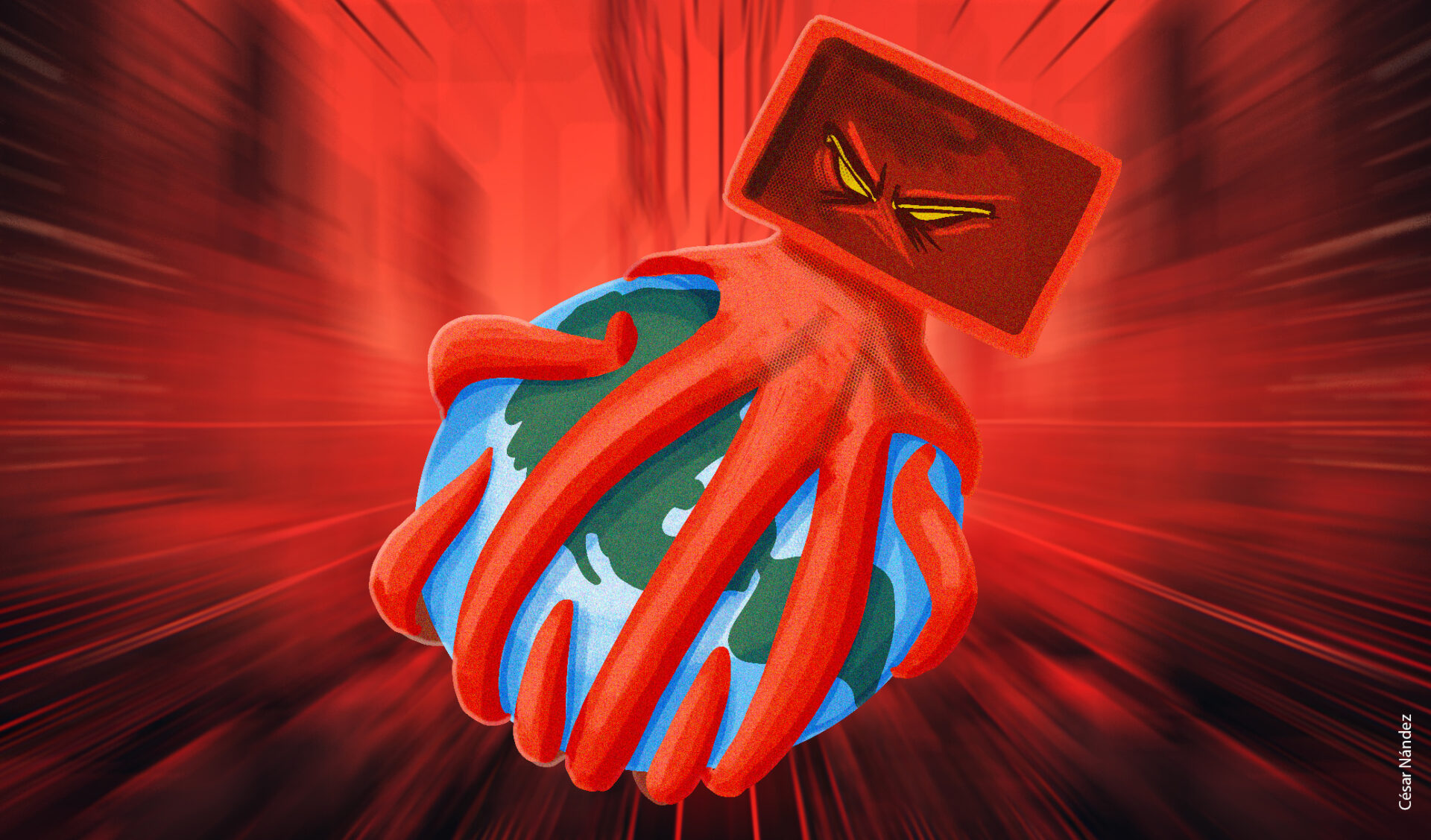“Today, authoritarian regimes are adapting their practices of oppression and limitation of freedom to the digital era. This is how they find new ways to weaken democratic institutions and the integrity of the public space, compromising in the process the exchange of ideas.”
I remember that in the framework of an Electoral Observation Mission in Bolivia, we were monitoring the media during the electoral process and I got my hands on the paper edition of one of the most important newspapers in the country (a media that did not support the then government of Evo Morales). To my surprise, it included a voluminous supplement of many pages under the following title: “China and the promotion of Human Rights”. This supplement paid for by an international non-governmental organization linked to the Chinese regime told minimal stories of Chinese men and women who received some kind of state assistance as a form of historical reparation, whether it was the provision of water, electricity, or some kind of infrastructure work. The level of official propaganda was shocking, with the ultimate goal of misinforming about the reality of human rights in the country without the rule of law and with a single-party regime. This kind of situation is repeated over and over again with very varied strategies. For example, the emergence of influencers in social networks who from free and democratic societies speak wonders of autocratic regimes such as those of China, Russia, Cuba, or Iran. They even make sponsored trips to closed countries, with the approval and monitoring of the host government itself, to wash the face of these regimes. These disinformation strategies are very effective and are prevalent on networks such as X, Instagram or TikTok.
The erosion of democratic systems is evident. Many analysts agree in calling this period of “democratic recession”, so it is important to highlight some efforts made by the international community to account for the various autocratic strategies of “harassment”, as I have characterized it in other articles (autocratic harassment).
Under this premise, the International Forum for Democratic Studies at the National Endowment for Democracy (NED) begins its work on the Sharp Power Research Portal. It seeks to be a space for journalists, researchers, activists, policymakers, and other citizens interested in understanding how authoritarian regimes exert influence on societies and institutions beyond their borders to access information. The goal of the website is to sort, categorize, and present existing research or journalistic reporting on what is defined as sharp power.
The concept of sharp power, as understood by Christopher Walker and Jessica Ludwig, refers to the use of manipulative diplomatic policies by one country to influence and weaken the political system of another. Under this definition, Walker sees sharp power as taking advantage of asymmetries between free and authoritarian countries, enabling regimes to limit free expression and distort the political environments of other countries, while shielding their own public spaces from outside democratic pressures and influences.
This would seek to influence civil society and the public environment of a free country to, in one way or another, tip the balance in favor of the regimes in question. Instead of having a positive and stimulating effect on civil society as soft power situations can have, in this case, the authors of the Sharp Power website consider that sharp, penetrating, or incisive power ends up limiting free expression and pluralism while distorting the national political environment.
The portal analyzes how five authoritarian nations (China, Russia, Iran, Saudi Arabi, and the United Arab Emirates) exert their influence on 143 countries in the world, according to its latest update. The chosen countries (identified as “authoritarian influencers” on the portal) were selected as they are among the most aggressive authoritarian regimes in their exercise of acute power and their actions are among the most documented. The cases of acute power are further classified into five areas: Information and Media, Commerce, Culture and Entertainment, Knowledge Generation, and, finally, Technology.
The Information and Media category tries to capture all the behaviors of these governments in social networks and the digital ecosystem. The economic vulnerability of the current media space and the ease of introducing information to the virtual sphere have enabled many cases of disinformation, digital harassment, and funding of small media. These tools have allowed regimes to influence public discussion.
Commerce condenses the use of companies and economic agents linked to political power in their country of origin. The capture of economic systems by the state in these countries allows the use of local companies for a practice that the portal defines as “corrosive capital”. Taking advantage of the layers of anonymity that the globalization of finance enables, these regimes allow themselves to use domestic capital investments strategically to advance their interests abroad.
Concerning Culture and Entertainment, it is all about incorporating everything that is traditionally understood as propaganda. Through traditional, but also digital media, it would seek to influence external cultural and artistic spaces in the same way that these countries already control domestic ones. This can lead to cases of self-censorship or adaptation of content so as not to strain cultural and artistic ties with countries that exercise such acute power. Such situations have been seen in video games, sports, cinema, and other forms of art and culture.
As far as Knowledge Generation is concerned, this area covers those academic and intellectual institutions that in free societies are usually autonomous and not subject to pressure. Pressure from regimes to shape how these institutions publish maps and images or narrate certain events can come to free countries in the form of funding pressures or the flooding of public space with think tanks that repeat the propaganda of autocracy.
And finally, concerning Technology, it is all about the expansion of the internet of things and platforms such as Google and Apple, which move massive volumes of information. These may be subject to pressure from the governments observed. The censorship of applications, the use of Artificial Intelligence to optimize censorship, and the possibility of exploiting vulnerabilities in new technologies to advance their objectives are included in this category.
According to the portal, all the resources included in it are written or published by authors or media of confirmed credibility. The ultimate goal of this project is to demonstrate the presence of large-scale, identifiable patterns of behavior in how these regimes engage with societies in the rest of the world. Although most of the resources are in English, the portal states that they have tried to expand their resources in Spanish, French, Russian, and Arabic.
Naturally, the portal cannot guarantee that its collection is exhaustive and complete: the limitations of the resource, acknowledged by the generators themselves, prevent many cases and examples of acute power from ever being recorded. Despite these limitations, the portal’s purpose remains relevant, and its collection is constantly expanding. Its database is freely accessible to the public and holds outstanding potential for the future study of authoritarian regimes in the digital age.
I understand that this NED instrument will become soon an inescapable reference for researchers of comparative social sciences, it will be a true “classic”, at the level of The Economist Democracy Index, V-Dem, or Freedom House’s world map of freedom of expression.
In Latin America, we have seen how many democratic breakdowns have occurred with the open sponsorship of certain autocracies. In Venezuela, the influence of Russia and Iran are not mere suspicion, on the contrary, it is well documented. The Russian and Chinese presence in Cuba is also notorious. The same in countries that are still considered democratic, such as Bolivia. In Argentina, under the government of Cristina Fernández, the Chinese government had the approval to build a “space” monitoring base in Patagonia, and in the last government of Alberto Fernández, the presidential candidate and Minister of Economy Sergio Massa received a suspicious and opaque loan of money in the middle of the campaign to face some international due dates. The examples are overwhelming and for this very reason, this project that we have presented here is of transcendent importance to account for the illiberal influences, corruption, and the loss of political and economic sovereignty of the countries of our region. In short, that is what the objective of Sharp Power is all about.
*Translated by Janaína Ruviaro da Silva from the original in Spanish.













